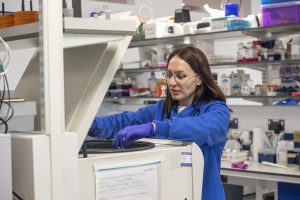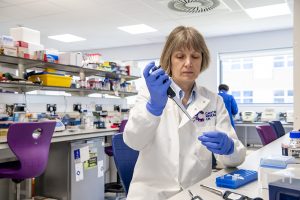For decades, Southampton researchers have been at the forefront of developing new treatments for cancer and other diseases.
 Now, a cancer fighting antibody, co-developed by scientists at the Centre for Cancer Immunology, has been granted Orphan Drug Designation by the US Food and Drug Administration (FDA) for follicular lymphoma (FL), providing a more streamlined pathway for its development in the most common form of slow growing Non Hodgkin Lymphoma (NHL).
Now, a cancer fighting antibody, co-developed by scientists at the Centre for Cancer Immunology, has been granted Orphan Drug Designation by the US Food and Drug Administration (FDA) for follicular lymphoma (FL), providing a more streamlined pathway for its development in the most common form of slow growing Non Hodgkin Lymphoma (NHL).
Work in 2015 by Southampton scientists showed that targeting an inhibitory immune receptor called FcgRIIB with an antibody called BI-1206, can help overcome resistance of certain blood cancer cells to treatment. In the pre-clinical study conducted with BioInvent International, BI-1206, was shown to act by recruiting host immune cells toward the tumour leading to cancer cell death, as well as enhancing the anti-cancer effect of other therapeutic antibodies, such as rituximab, by stopping them being absorbed by the tumour cells.
Following this successful lab-based research, the team, led by Professor Andrew Davies at Southampton went on to conduct first in human trials of BI-1206 funded by Blood Cancer UK and BioInvent International and sponsored by CRUK to assess the maximum dose that could be given safely to humans alone and in combination with rituximab. Subsequent studies funded by BioInvent International went on to evaluate BI-1206 in combination with rituximab for the treatment of NHL, which includes patients with FL, Mantle Zone Lymphoma and Marginal Zone Lymphoma who have relapsed or are refractory to rituximab.
Based upon the positive signals from these early studies, BI-1206 has now been granted Orphan Drug Designation (ODD) by the U.S. Food and Drug Administration (FDA) to support the further development of the drug in FL.

Professor Mark Cragg, from the University of Southampton, who led the 2015 research, alongside Dr Ali Roghanian and Professor Bjorn Frendeus said: “Southampton has a rich history of taking lab-based research into the clinic and this is a perfect example. We are very proud that our original research, undertaken alongside BioInvent International, is progressing through clinical studies with the possibility of making positive impacts on patients’ lives.”
But this is not the only success. Work by Professors Sally Ward and Raimund Ober has underpinned two drugs which have recently received approval by the FDA.
Evusheld is a combination (cocktail) of the monoclonal antibodies Tixagevimab and Cilgavimab and has been approved to prevent COVID-19 in immunodeficient adults and children.
Tixagevimab and cilgavimab are long-acting monoclonal antibodies that are specifically directed against the spike protein of SARS-CoV-2, designed to block the virus’ attachment and entry into human cells. Tixagevimab and cilgavimab bind to different, non-overlapping sites on the spike protein of the virus.
In 1996, Professor Sally Ward’s laboratory, which was then based at the University of Texas (UT) Southwestern Medical Center in Dallas, identified the Fc receptor, FcRn, as a global regulator of antibody (IgG) levels. Her laboratory showed that engineering antibodies to bind more tightly to FcRn within cells would extend their persistence in the body and lead to longer-lasting effects for the patient. UT Southwestern licenced this so called half-life extension technology to Medimmune, and it has been used to extend the longevity of the antibodies that constitute Evusheld.
Following on from this successful work, in 2005, the team engineered antibodies that bound very tightly through their Fc region to FcRn, leading to blockade of binding of naturally occurring antibodies to this receptor. This approach has been named Abdeg technology, for antibodies that enhance IgG degradation. Engineered antibodies of the Abdeg type can be used to inhibit FcRn activity and reduce the levels of antibodies, including ones that cause autoimmune disease, in the body.
The Abdeg technology was licenced to Argenx, and has led to the development of the drug Vyvgart (efgartigimod). In mid-December 2021, Vyvgart was approved for the treatment of the autoimmune condition, generalized myasthenia gravis (gMG) in adults.
Vyvgart is the first approval of a new class of medications based on inhibiting FcRn. It is also being used in late stage clinical trials for other autoimmune disorders such as autoimmune blistering diseases and immune thrombocytopenic purpura.

Professor Ward said: “As scientists, we know it can take years for our lab-based research to have an impact in the clinic and on patient lives, and it is both very gratifying and exciting to see these recent approvals from the FDA for drugs that have stemmed from the licencing of technologies that have come out of our lab. We have worked closely with Argenx on the development of Vyvgart and the company has done an impressive job of moving this forward in the clinic to treat potentially devastating diseases such as myasthenia gravis, a chronic autoimmune, neuromuscular disease. “
“There is an interrelationship between autoimmune diseases and cancer –for cancer, it is desirable to upregulate the immune response against tumours, whereas in autoimmunity, downregulation of the self-directed immune response that is causing the disease is the goal. We are using our experience in these areas to drive our research at the Centre for Cancer Immunology forward.”